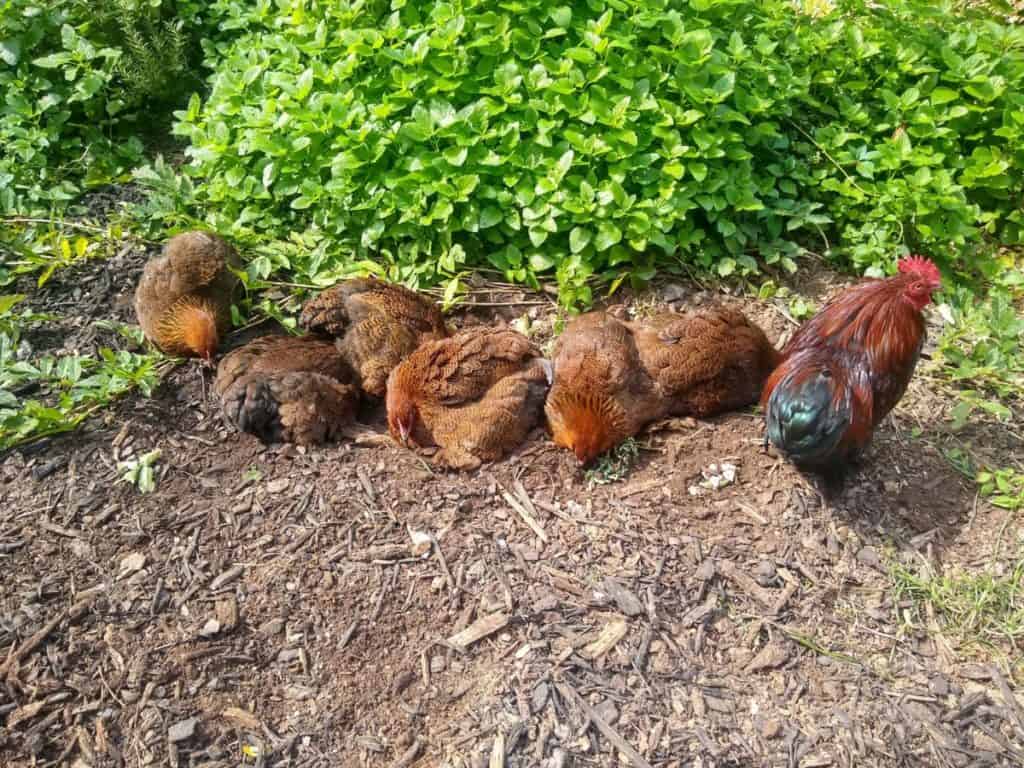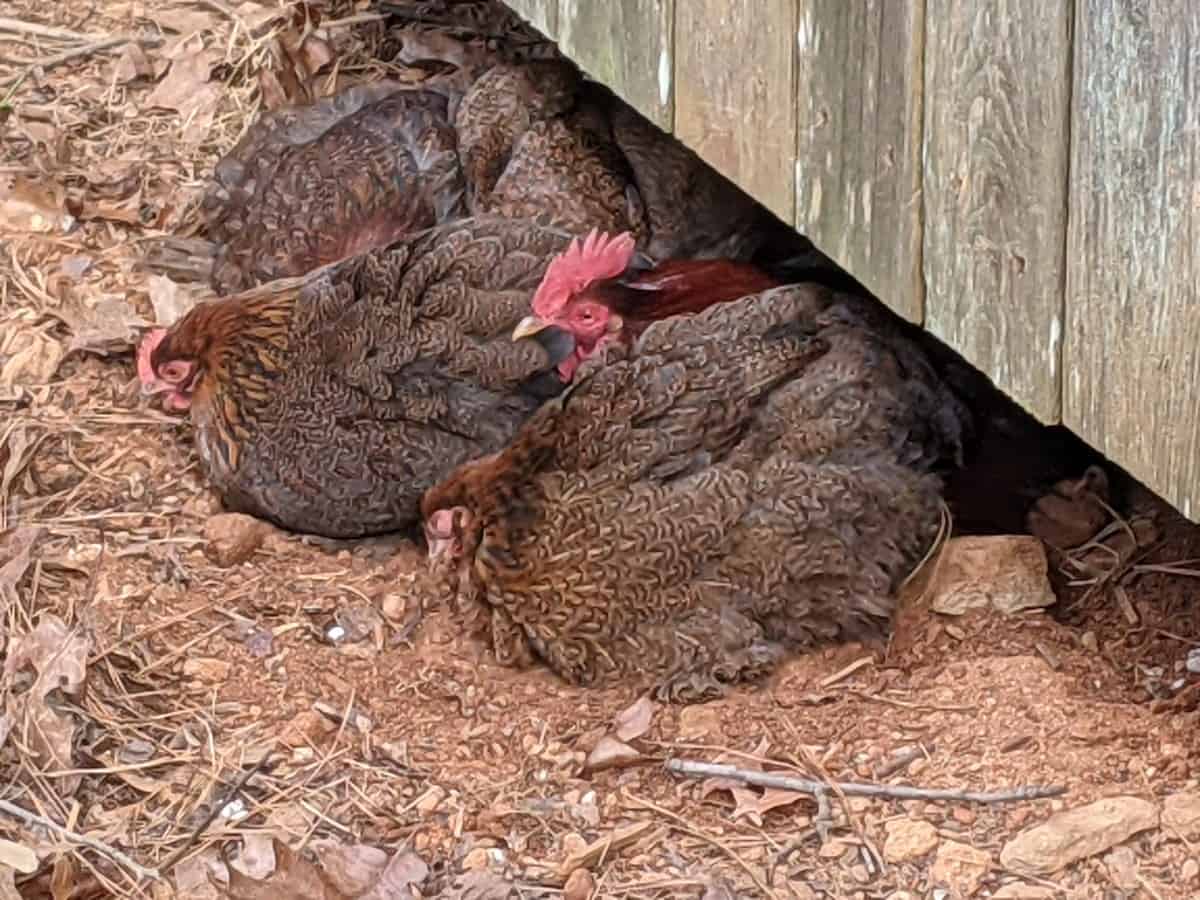
I recently purchased a chicken tractor and after a hawk attack, I have mostly kept my chickens locked in the tractor which is an Omlet Eglu. After a few days, I noticed they were less fluffy and looked thinner.
Then it dawned on me, they hadn’t had access to a dirt bath. When they were free-range this wasn’t a problem, but now that they were cooped up it was.
Which brought me to my question, how often do chickens take dust baths? Chickens will dust bathe every day or every other day if they have access to dirt that is useable. During a dust bath, they throw dirt on and into their feathers for several minutes. When they are done with the dirt bath they will shake the dust particles out of their feathers and go about their day.
Taking this into consideration I need to balance their need to bathe with the threats of letting them out of the tractor.
While daily would be best, I think for now every other day is a good solution. Our flock started looking pretty sad after 4 days, so I would set that at the maximum.
What is a Dust / Dirt Bath for Chickens?
A dust bath for chickens is anywhere that they can dig into the loose dirt to bathe themselves. If an area is not provided for them they will create their own, even in your vegetable garden!
If your chickens are confined and don’t have access to dust needed for bathing then you should provide one.

Why do Chickens Take Dust Baths?
Just as you and I need baths, so do chickens. Chickens spread an oil secreted from their preen gland, located near the base of their tail. This helps their feathers be clean and well-groomed.
As these oils oxide and breakdown, the chickens need to remove and replace them.
As we know, oil and water don’t mix so this is where the dust comes in. The dust removes the oil that the parasites feed off of cutting off their food source. It also suffocates the lice and mites living on their skin.
Dust bathing is just one part of the preening process. Once the dust has removed the traces of oil, the chicken will then collect oil from the preen gland. They do this by rubbing the beak and head over the gland and spread the oil onto its feathers.
This oil makes the feathers dirt and water repellent, keeping your chickens cleaner and healthier.
You will also see your chickens biting at themselves, this is to remove any parasites or bits of dirt. Since grooming is a social event for chickens you will also see them biting each other as well.
How do Chickens Dust Bathe?
Dust bathing starts with finding the right area to bathe. My chickens like the dry soil under my deck on rainy days. They begin by scratching and flinging dirt and dust around, creating a dust bath hole.
In the summer this helps keep them cool by allowing them to rest on the cooler soil that is located a few inches down.
During this time you will see dust flying, fluffing feathers, outstretched wings, and sometimes feet sticking straight up!
Once they have covered their body with the dirt they will often lay down and start rubbing themselves in the dirt. They do this by laying down and using their foot to push themselves around their dust hole.
The first time I saw a chicken do this I thought it was injured.

What to Use for a Dust Bath?
If your chickens are out they can find their own dust bath area or you can create your own dust bath for them. First, you need a container, litter boxes, crates, kiddie pools, and tires are frequently used.
We use a sandbox that we purchased for our daughter that she no longer uses.
Fill your container 3/4 of the way with a 50-50 mix of sand and dry dirt for a basic dust bath. You can use play sand or builder’s sand from your local hardware store. Adding food-grade diatomaceous earth to your mixture will deter mites, ticks, and lice from your flock.
Wood ash from a fire that wasn’t started with lighter fluid or chemical-laden fire starter bricks, provides magnesium, vitamin K, and calcium. Dried lavender is good for repelling mosquitoes, flies, and ants.
Dried lemon balm, repels bugs, has an aromatherapy calming effect, and antibacterial properties that can be added for a complete day spa experience!
Do Chickens need a Dust Bath in The Winter?
Yes! Chickens need access to dust baths year-round for their optimal physical and mental health.
Why do Chickens Dust Bathe Together?
Chickens are social flock birds, that’s why you need to have at least two or more chickens. Keeping themselves and the flock clean helps ensure the flock thrives. The grooming process also keeps the pecking order or hierarchy in check.
It also just makes grooming easier when your flock mate can get to areas that you can’t.
Below is a video of my chickens giving themselves a dust bath.
Why is My Chicken Lying in The Sun?
Another part of the grooming process is sunbathing. You may see your birds with their wings outstretched lying in a sunny area.
This helps warm the oil making it easier to spread. It also helps kill off any remaining germs and parasites, similar to UV light. If you come across a sunbathing chicken you may think it’s dead, but they are just soaking up the rays!
Final Thoughts
In conclusion, dust baths are crucial for the overall well-being of your flock. If they are unable to access a suitable area for bathing due to rain, snow, or chicken tractors you need to provide it.
Happy and healthy chickens will produce many happy eggs!

